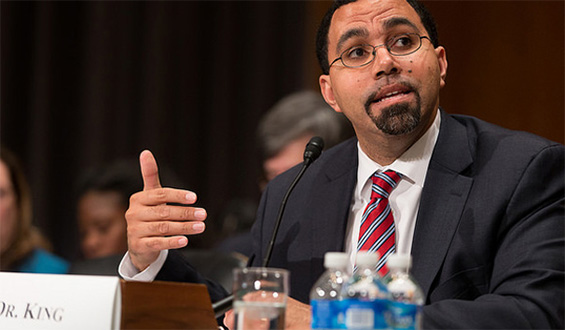Education
White House Asks Colleges to Look Beyond Crimial Histories

The White House and the US Department of Education are asking that colleges and universities across the country consider no longer asking applicants about their criminal history as part of the admissions process.
The initiative, meant to increase access to higher education for millions across the country, came after a meeting with presidents, deans, provosts, and other representatives from institutions that had already taken the Fair Chance Education Pledge.
“This is about persuading institutions to do the right thing with respect to how they admit their students,” Secretary of Education John King said. “This effort is about removing arbitrary obstacles.”
The move came as a response to an April report in The Atlantic which found a number of admissions procedures that targeted students with criminal histories. The report argued that this can decrease educational opportunity for these students, writes Juleyka Lantigua-Williams for The Atlantic.
“Our goal here is to ensure that when people are released they have an opportunity to live a law-abiding life, that they have all the tools they need in order to thrive once they are released,” said Valerie Jarrett, senior adviser to the president.
One survey found 35% of the institutions of higher education who responded admitting to denying a spot to prospective students as a result of their criminal history.
King said he expects the pledge to have the greatest effect on students of color. He added that because African Americans and Latinos are overrepresented in the US prison system and among those who hold criminal records, the pledge should help these groups of people gain access to higher education.
However, the pledge does not discuss questions asked about a person’s criminal history during the interview process, which could be considered the greatest barrier to higher education. Instead, it asks schools to recommit to creating opportunities for all students while at the same time paying attention to returning citizens.
Each institution that agrees to the pledge will be required to create an individualized plan that shows how they will go about reaching the goal of expanding access to higher education. A number of leading universities have already signed on, including Boston University, Columbia University, Cornell University, New York University, and the State University of New York.
Gaining the support of SUNY schools was seen as a victory by advocates who say that a person’s criminal history is not correlated to their academic potential. The state system not only was the subject of a study that looked into the impact of these practices on potential applicants, but also has a separate application process for prospective students who have felony convictions. According to report results, 62% of applicants to the SUNY system who also had criminal convictions did not complete the application process in comparison with just 21% who did not have any convictions.
Long-term studies will need to be performed in order to determine the effectiveness of the efforts. However, the administration said they do not have any plans for this in their rollout or recommendations.
“There’s a high level of interest in the philanthropic community to support these kinds of initiatives,” she said. “The administration would welcome the collaboration of the nonprofit sector in evaluating the effectiveness of this and related efforts.”
Author information
The post White House Asks Colleges to Look Beyond Crimial Histories appeared first on Education News.


Comments (0)